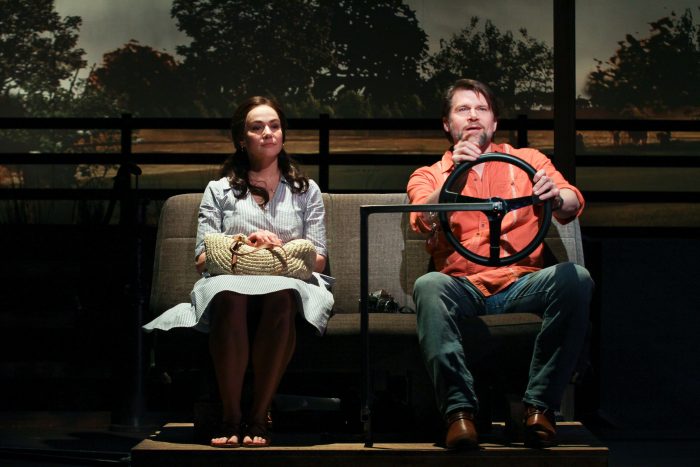
The Bridges of Madison County. Philadelphia Theatre Company through March 3, 2019.
For its second production — and first musical — since its reorganization, Philadelphia Theatre Company made a curious choice.
The Bridges of Madison County is far removed from the initial offering of Lynn Nottage’s Sweat, a Pulitzer Prize-winner that dealt with racism and economic problems in Reading Pennsylvania. Even though I faulted the production, the play certainly had strong elements.
But The Bridges of Madison County is a tawdry soap opera about a married mother of two teenagers who throws herself at a strange man within minutes of meeting him. He’s passing through town, rings her doorbell to ask directions, and she volunteers to get into his car.
It is staged attractively by Mark Martino, and the leading characters are ably acted and well sung by Sarah Gliko and Gregg Goodbrod. Moreover, outstanding supporting performances are given by Rachel Camp, Barbara McCulloh and Greg Wood. Nevertheless, the material is crass .
When this musical version of The Bridges of Madison County debuted on Broadway in 2014 the reviews were mediocre, and it ran for only 100 performances. One of the most favorable reviews was headlined “Weepy romance detours into conventional Broadway.” Others called it “cringe inducing,” “a snooze” and “insipid.”
Eons ago there were tasteless vaudeville jokes about traveling salesmen and farmers’ daughters having sex. That’s basically the plot of this musical. An Italian war bride who married an Iowa farmer is restless. When a hunky photographer comes looking for covered bridges she jumps into bed with him for a three-night stand while her hubby and kids are out-of-town.
You might think the show would be a fantasy dream for men, but that’s not the case. The only people I’ve found who loved it are female, but some of the harshest critics also are female. (See Toby Zinman in the Philadelphia Inquirer who called it “lame” and “condescending.”)
The movie version had an advantage because Meryl Streep and Clint Eastwood are so personally appealing, and their advanced ages implied that they were succumbing to a somewhat-excusable last fling. In this musical the couple’s ages are, realistically, much younger. (She married right after the war in 1945 and now it’s 1965, and her kids are in their teens.)
Our natural reaction to Francesca is that she’s a slut. The structure of the play (by Marsha Norman) doesn’t help, because Francesca’s narrative song doesn’t come until Act II, so when we meet her we don’t know much about her background and we feel scant empathy.
The music by Jason Robert Brown is one reason to pay attention. He is one of the most talented composer/lyricists of our time. He gives his Italian heroine some soaring melodies that approach the operatic, in “Almost Real” and “To Build a Home.” These numbers are lush, and he includes lovely interludes for cello, but there’re few love duets. For the other characters, Brown provides songs in a variety of styles, including country and old-fashioned pop. He’s very good at composing hooks (He has the best hooks since Kareem Abdul-Jabbar) — that is, catchy short sequences of notes that he repeats and embellishes. On the other hand, Brown doesn’t create long melodies as Gershwin, Rodgers and Andrew Lloyd Webber have.
The original novel was more gripping. It described the photographer: “At 52, his body was all lean muscle…belly flat as a knife blade….She noticed how small his rear was in his tight jeans….He was tall and thin and hard, and he moved like the grass itself, without effort, gracefully.”
That’s middlebrow cliché, but it’s more interesting than anything spoken or sung in this musical.